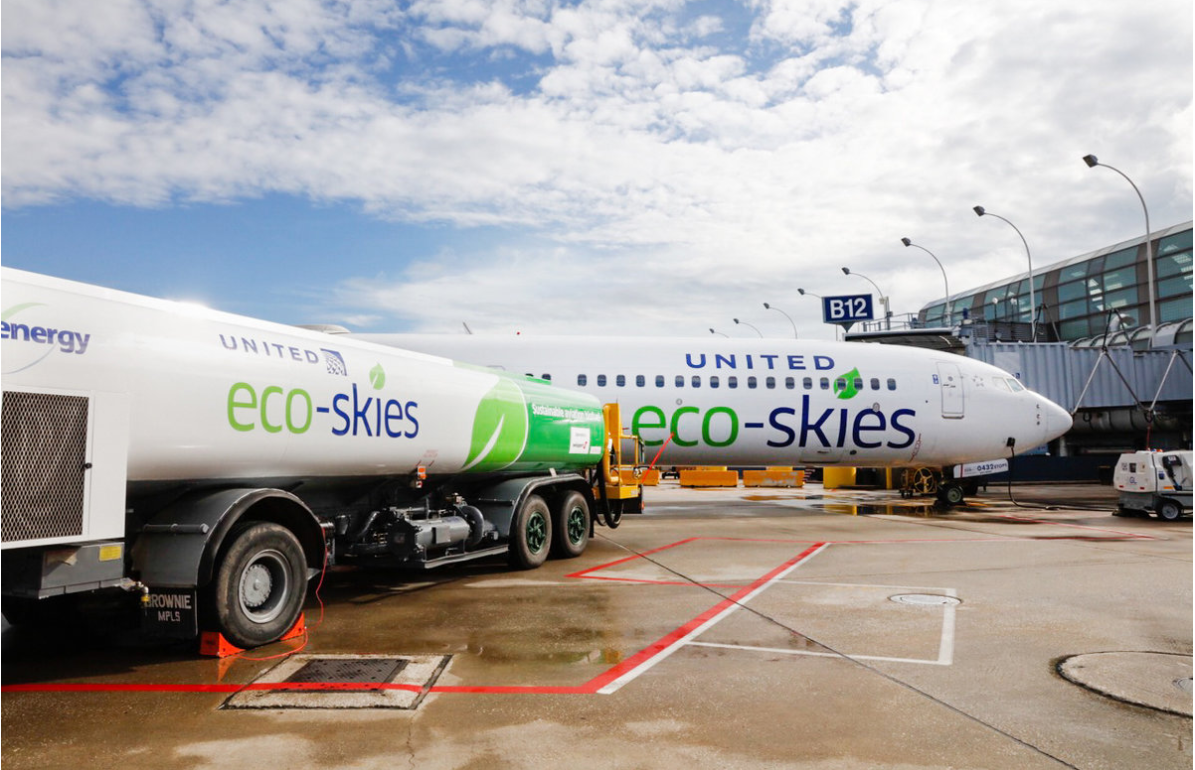United Makes Major Joint Venture Investment for SAF

United, energy infrastructure company Tallgrass and biorefinery Green Plains Inc. have revealed a joint venture – Blue Blade Energy – to develop a new type of Sustainable Aviation Fuel (SAF) technology that relies on ethanol as its feedstock.
The Technology Behind the New Fuel
If the technology behind the new fuel works, the three parties will construct a pilot production facility in 2024. All being well, full commercial operations by Blue Blade to produce the ethanol-based fuel could begin by 2028. Combined, the three entities are set to invest a total of $50 million in this new venture. As part of the offtake agreement, United could be provided with 135 million gallons of this new fuel on an annual basis and as much as 2.7 billion gallons in total.
The research and development behind Blue Blade’s SAF was undertaken by the Pacific Northwest National Laboratory, a facility of the U.S. Department of Energy. It is notable for being a center of research for the development of alternative sustainable energies. When compared to traditional jet fuel, ethanol-based SAF offers 85 percent less lifecycle greenhouse emissions. Under the terms of the joint venture, Tallgrass will manage the research and development portion of the project, Green Plains will supply ethanol feedstock and manage the pilot facility’s operations while United Airlines will offer assistance with the onward development of SAF.
A Collaborative Approach
In a statement, United’s President of Ventures, Michael Leskinen, said, “This new joint venture includes two expert collaborators that have the experience to construct and operate large-scale infrastructure, as well as the feedstock supply necessary for success. Once operational, Blue Blade Energy has the potential to create United’s largest source of SAF providing up to 135 million gallons of fuel annually.”
Speaking on behalf of Tallgrass, Alison Nelson, Vice President, Business Development, commented, “At Tallgrass, we are striving to innovate how we deliver the energy that powers our nation and enables our quality of life. Air travel uniquely connects people and improves lives, and the advancement of this novel SAF technology presents a meaningful opportunity to reduce emissions from aviation. We are excited to partner with industry leaders United Airlines and Green Plains on this initiative.”
Commenting for Green Plains, Todd Becker, President and CEO, said, “Our transformation to a true decarbonized biorefinery model has positioned Green Plains to help our customers and partners reduce the carbon intensity of their products by producing low-carbon proteins, oils, sugars and now decarbonized ethanol to be used in SAF. This partnership with world class organizations like United Airlines and Tallgrass, shows the value creation that is possible with our low-carbon platform. The potential impact of this project is a gamechanger for US agriculture, aligning a strong farm economy and a robust aviation transport industry focused on decarbonizing our skies.”
The investment into Blue Blade Energy is notable for being one of the largest made via United Airlines Ventures (UAV) and is likewise important for highlighting the carrier’s overall aim of reaching net zero emissions by 2050 without having to rely on traditional offsetting techniques.
Share your thoughts about United’s big SAF investment on the FlyerTalk Forums























Doesn't anyone realize that most biofuels are plant or agricultural based? It takes land, water and fertilizers to make that happen. There is only so much used french fry oil available in the world.
Remember, when someone says "biofuels", think "food". When we can feed everyone, biofuels in volume make sense.
This comment has been reported for wrongthink.